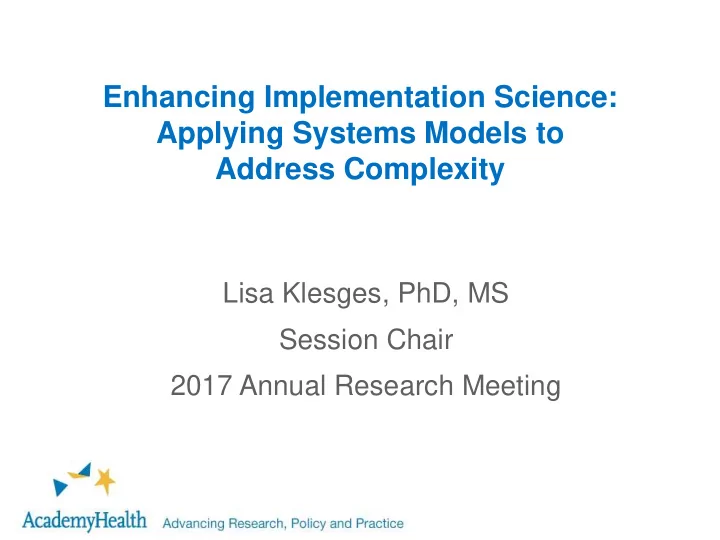

Enhancing Implementation Science: Applying Systems Models to Address Complexity Lisa Klesges, PhD, MS Session Chair 2017 Annual Research Meeting
Consider… What are new opportunities for systems science in implementation research? How do systems models evaluate the impact of contextual factors on implementation of interventions? Can systems models help us consider implementation problems in new ways? 2
Aspiration for Systems Implementation “…transform health care by moving from its historic “linear, deconstructed model” that falls along traditional disciplinary boundaries to a “ complex, adaptive system ” that drives better performance outcomes, and considers healthcare as a complex social process.” -- Paul Batalden
Complicated Linear Logic Model of an Obesity Intervention Low-income Neighborhood Schools Moderator Setting Family Environment BMI Behavior Obesity Longer- Mediator Short-term Intervention Term Outcome Outcome Moderator Moderator Child Age Parent BMI
5 Linear deconstructed evidence not sufficient for complex implementation decisions: Based on narrowly selected groups of participants, clinicians, settings Modeling does not account for adaptive, evolving circumstances or interventions Lack contextual evaluation among community characteristics, clinical settings, local priorities Outcomes often not relevant for clinical or policy decisions Glasgow RE et al. Practical clinical trials for translating research… Med Care 2005;43:551-557 Peek CJ, et al. 5 R’s: An Emerging Bold Standard for Conducting Relevant Research in a Changing World; Ann Family Med, 2014
Characteristics of a Complex System Made up of a large number of heterogeneous elements Elements interact with each other often as non-linear and non-deterministic Interactions produce an emergent effect that is different from the effects of the individual elements Effects persist over time and adapt to changing circumstances Systems Science Methods in Public Health: Dynamics, Networks, and Agents. Luke DA, Stamatakis KA; Annu Rev Public Health. 33: 357 – 376, 2012.
Obesity: Complex Systems Problem Seeing obesity as a systems problem. Newell B, Proust K, Dyball R, McManus P. N S W Public Health Bull. 2007 Nov-Dec;18(11-12):214-8.
Predominant System Modeling Approaches Agent-based Modeling : examines actions of agents (e.g. individuals) in environments (e.g. neighborhood); decision rules simulate interactions of agents and environments Systems Dynamics Modeling : conceptualize trajectories of outcomes over defined time horizons; pathways complicated and understood via computer simulations Network Analysis : studies structure of relationships between a set of nodes (e.g., people, sites); considers relational patterns within a system (e.g., how frequent is flow between nodes?) Burke JG, Lich KH, Neal JW, et al. Enhancing Dissemination and Implementation Research Using Systems Science Methods. Int J Behav Med. 22(3): 283 – 291, 2015.
Opportunities for Systems and Implementation… Multi-sector stakeholder perspectives to develop, assess, and advocate for evidence-based improvements Propels discovery considering multi-level socio-technical advances (e.g., social networks, bio-sensing, geospatial) Addresses large unexplained variation in clinical and community outcomes (increases contextual information) Creates actionable evidence for decision-making for clinical and community improvement Patty Mabry, 2012
Presenters Lindsey Zimmerman, PhD, Clinical & Community Psychologist, Implementation Science, National Center for PTSD; Affiliate Instructor, University of Washington School of Medicine Stephanie B Wheeler, PhD MPH, Associate Professor Health Policy & Management, Gillings School of Global Public Health, University of North Carolina at Chapel Hill Douglas A Luke, PhD, Professor; Director, Center for Public Health Systems Science, Brown School of Social Work, Washington University in St Louis David Chambers, D.Phil., Deputy Director for Implementation Science, Div of Cancer Control and Population Sciences, National Cancer Institute
Selected PARs PAR-15-048 Systems Science and Health in the Behavioral and Social Sciences (R01) PAR-15-047 Systems Science and Health in the Behavioral and Social Sciences (R21) PAR-15-085 Predictive Multiscale Models for Biomedical, Biological, Behavioral, Environmental and Clinical Research (U01)
Recommend
More recommend